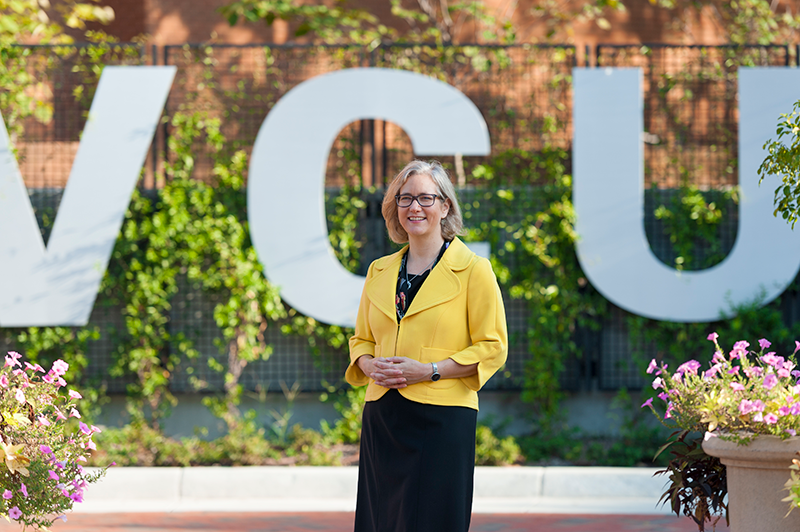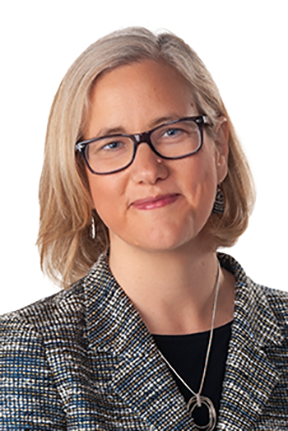Beth Angell’s origin story: From first-generation student to social work dean

Beth Angell’s social work story actually starts with a chapter focused on psychology.
“I have to admit that I had never met a social worker or understood what one was until I was in college,” says Angell, Ph.D., who became dean of the VCU School of Social Work in the summer of 2018.
SOCIAL WORK MONTH: 2021: ORIGIN STORIES
As an undergraduate student at the University of North Carolina, she majored in psychology and worked as a technician in a neuroscience lab.
“My goal was to be able to help people with mental health problems, because of my experiences with mental illness in my own family,” she says. “My supervisor, who directed the lab, suggested to me that becoming a clinical social worker might be a more direct path to that goal than pursuing a career as a scientist.”
Because UNC did not have an undergraduate social work major, Angell took advantage of any service learning opportunities to get hands-on experience. She then pursued her Master of Science in Social Work degree at the University of Wisconsin.
Social work ‘made so much sense’
“Once I entered a social work program as a master’s student, the orienting frameworks of social work, like the person-in-environment perspective, just made so much sense to me,” she says. “It was clear that I had found my academic home.”
Angell says her family supported her career choices, particularly because she would be doing work that felt connected to their struggles.
“I was raised by a single father, and although he was not himself a college graduate, he was always a huge cheerleader for whatever I wanted to do,” she says. “I feel incredibly fortunate to have had adults in my life growing up who conveyed the message that I could be successful no matter what I chose to do with my life.
“Because my dad’s life had been profoundly impacted by mental illness within our family, he was proud that I chose a profession that would enable me to help other families like ours.”
Mentors ‘helped fill in the gaps’
Faculty and staff support made it easier for her, as a first-generation student, to adjust to higher education.
“I was one of those college students who struggled initially with some of the unwritten rules of how to excel in college, but I gradually gained confidence in asking for help from advisors and professors,” Angell says. “One of the most useful things I did was to volunteer to help faculty with research projects, and in doing that, I gained opportunities to be mentored by them. Those relationships helped me fill in the gaps in areas like writing, time management and networking.”
Her master’s field placement was at an agency that served as a national model for community-based treatment for serious and persistent mental illness.
“One of the exciting things about that experience was that my professors were directly involved in doing the research that had demonstrated the effectiveness of this treatment mode,” she says. “I was inspired that research provided a way to increase the impact of what I was doing as a practitioner.”
‘Importance of work-life integration’
As a result, she decided to continue at the University of Wisconsin to study for a Ph.D. degree in social welfare. During that time she and her husband, Andrew Murphy – now a professor in VCU’s Department of Political Science – had two boys. As she moved into the faculty ranks following graduation, the boys became fixtures at work.
“Like many of our students, I had to learn to balance family and school responsibilities,” Angell says. “Fortunately, my mentors and professors were extremely supportive of me as a parent, and remembering how important their encouragement was, I have tried to do the same with students that I mentor.
“Once I became a faculty member, I remember many afternoons spent with my kids doing their homework in my office, trick-or-treating in my classes and, when they got older, attending lectures on campus. While one hears many negative stories about lack of support for parenting in some fields, I think in social work we more readily understand the importance of work-life integration.”
‘You belong here’

Following social work faculty positions at the University of Chicago and Rutgers University, she was hired as the 10th dean of social work at VCU. She is proud of the school’s quality and reputation, but admits that there are areas where the school has fallen short in regard to equity.
“The social work education we provide always has and continues to be rigorous and high quality, and we are rightly recognized as one of the top programs nationally,” she says. “As I’ve gotten to know our students and alumni, I have come to realize that we have not always served all students equally well, and we need to be more intentional about addressing inequities – through changes in our policies, practices, and our curriculum. As a school, we are developing plans to bring an antiracist framework to our curriculum and to improve our methods of assessing and addressing student climate.”
On balance, she says, VCU is a place where students are supported and feel welcome.
“One of the things I appreciate is that we strive to be a place where first-generation students absorb the message ‘you belong here,’ and we try to tear down the barriers to success that often stop talented students from continuing,” she says. “We can and should do better, for sure, but that’s something our faculty and staff are all committed to.
“At our Fall 2020 Convocation, our invited speaker, Jackie Washington, said it best when she reminded our students that just by the very fact they are here, they are amazing! I want our students to know that they belong here, that our field needs them, and that we are committed to helping them learn what they need to learn to realize their dreams.”
Growing scholarships and stipends
Angell says she is fortnuate, and perhaps atypical, as a first-gen student.
“I think it’s important to acknowledge that although I was first-gen, I was still very much the beneficiary of white privilege, and I was also fortunate to have a lot of help – financial and social support – from my family along the way,” she says.
Half of her master’s degree was subsidized by the National Institute of Mental Health. She needed only one year of loans and was able to pay them off a few years after graduation. Making educational opportunities more affordable is an emphasis area.
“As a dean, I worry a lot about students who graduate with debt,” she says. “One of my major roles is to grow the school’s resources through fundraising. In that vein, my top priority is to grow scholarship and stipend opportunities to ensure that a social work education is accessible to a wide array of applicants that reflect the diversity of the communities we serve.”
Categories Faculty and staff, From the deanTagged Beth Angell, Origin Stories, Social Work Month, Social Work Month 2021